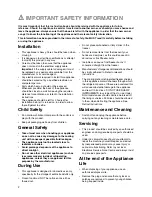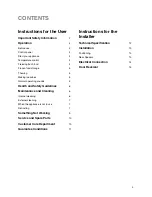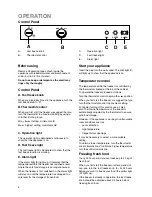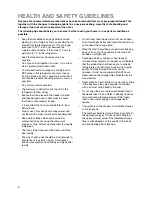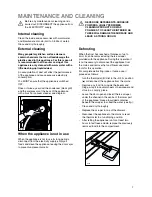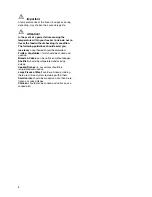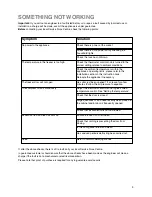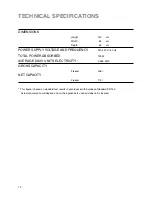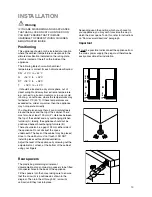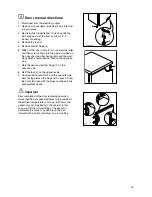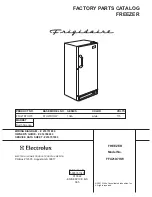
5
Normal Operating Sounds
•
You may hear faint gurgling or bubbling sounds
when the refrigerant is pumped through the coils
or tubing at the rear, to the cooling
plate/evaporator or to the fixed freezer shelves.
•
When the compressor is on, the refrigerant is
being pumped round, and you will hear a whirring
sound or pulsating noise from the compressor.
•
A thermostat controls the compressor, and you
will hear a faint ’click’ when the thermostat cuts in
and out.
Making ice cubes
The appliance is provided with one or more trays for
ice-cubes trays.
Fill the tray(s) 3/4 full to give the ice space to expand
and place them in the freezer compartment.
To release the ice cubes simply give the tray a slight
twist.
Do not use sharp or metallic instruments to remove
the trays from the freezer.
Thawing
Deep frozen or frozen food, prior to being used, can
be thawed in the fridge or at room temperature
depending on the time available. Small food items
may even be cooked from frozen; in this case
cooking will take longer.
Any frozen food which is allowed to thaw accidentally
should either be eaten as soon as possible or thrown
away. Alternatively, if the food is uncooked and has
not been completely defrosted it can be cooked and
then refrozen.
Meat, fish and fruit should be thawed in the
refrigerator compartment and small pieces of meat
can even be cooked while still frozen, but you must
ensure that it is thoroughly cooked through.
Vegetables should be directly immersed in boiling
water; ready-cooked dishes can be placed directly in
the oven in their aluminium wrapping.
A microwave oven is particularly suitable for thawing
any type of frozen or deep-frozen food: follow the
oven instructions, particularly regarding the
placement of aluminium wrapping or containers in
the oven.
Defrosted cooked food must never be refrozen.
This time can be shortened, depending on the
quantity of food to be frozen. After the time has
elapsed place the food to be frozen in the two top
compartments of the freezer as these are the coldest
parts.
Once the food is completely frozen (which could take
up to 24 hours) return the fast freeze switch to the
«N» position; the yellow light (D) goes off.
Distribute the frozen food packages in the other
compartments, so that the top compartments can be
used for a further freezing operation.
-
The food to be frozen must be fresh and of the
best quality.
-
Do not allow fresh food to touch food which is
already frozen.
-
During the freezing process, ensure that the
freezer door remains closed.
Frozen food storage
When you first start the freezer or if the freezer has
been out of use for some time, we advise you to run
your appliance for at least two hours in the «fast
freeze» mode before storing frozen food.
Do not exceed the storage period indicated by the
manufacturer.
Finally, do not open the door frequently or leave it
open longer than is absolutely necessary.
Warning
Do not put carbonated liquids, (fizzy drinks etc.), in
the freezer compartment.
Water ices, if consumed immediately after removal
from the freezer, can possibly result in a low
temperature skin burn.
Do not remove items from the freezer if your hands
are damp/wet, as this could cause skin abrasions or
“frost/freezer burns”.
Important
In the event of a power cut the food in the freezer will
not be affected if the power cut is short and if the
freezer is full. Do not open the door. Should the food
begin to thaw, it must be consumed quickly and must
not be re-frozen .
12
TECHNICAL SPECIFICATIONS
DIMENSIONS
Height
140 cm
Width
55 cm
Depth
60 cm
POWER SUPPLY VOLTAGE AND FREQUENCY
220-240 V / 50 Hz
TOTAL POWER ABSORBED
100 W
AVERAGE DAILY UNITS ELECTRICITY *
0.948 kWh
GROSS CAPACITY
Freezer
206 l
NET CAPACITY
Freezer
174 l
*
This figure is based on standard test results in accordance with European Standard EN 153.
Actual consumption will depend on how the appliance is used and where it is located.


